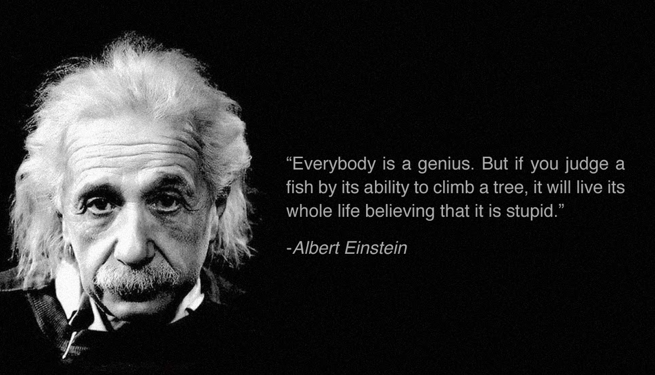Have you ever wished you were born a ‘genius’? For centuries people have believed that being a genius is innate; that some people are born with a special ‘gift’ often put down to their ‘genes’, that automatically makes them much smarter than the average person.
Well I have news for you. There’s a new kid on the block and it’s about to dispel all traditional thinking when it comes to the genius debate.
Introducing… Dynamic Development.
Dynamic Development is a new paradigm for talent, lifestyle & wellbeing. What’s amazing about this new model is that research has actually proven that although genes play a part in our ability, they actually only play a very small part.
“Contrary to what we’ve been taught, genes do not determine physical and character traits on their own. Rather, they interact with the environment in a dynamic, ongoing process that produces and continually refines an individual” David Shenk
The upshot is, that regardless of the genes that we inherit, we all have the ability to impact our own lives for the better.
David Shenk has spent years researching this topic in his book ‘the genius in all of us’. Here are some key points to take away from this fascinating read:
- No-one is genetically doomed to mediocrity
- Every human being (or even a whole society) can grow smarter if the environment demands it
- Intelligence is not fixed
- Talents are not innate gifts – but the result of a slow accretion of skills
- No one is genetically designed into greatness and few are biologically restricted from attaining it
This is groundbreaking research that means that EVERYONE has the ability to improve themselves.
So – if genes don’t matter for that much, what makes a difference?
As explored in Shenk’s book, several studies have been carried out and we now understand that the key factors for a childs’ development, are not the childs’ genes, but things like:
- Speaking to children early & often
- Reading to children early & often
- Nurturance & encouragement (the average child from a professional family receives 560,000 more instances of encouraging feedback than discouraging feedback, a working class child receives merely 100,000 more encouragements than discouragements & a welfare child receives 125,000 more discouragements than encouragements)
- Setting high expectations
- Embracing failure
- Encouraging a growth mindset
Take this further into adulthood and we now know the key themes for achieving greatness. Over the last 3 decades a psychologist named Ericsson examined high achievement from all angles – memory, cognition, practice, persistence, muscle response, mentorship, innovation, attitude, response to failure. He looked at achievement across all categories, including golfers, nurses, typists, gymnasts, violinists, chess players, basketball players & computer programmers.
Here is what Ericsson found:
Practice changes your body: there are physical changes in the muscles, nerves, hearts, lungs and brains of those showing profound increases in skill in any domain
Skills are specific: People who are amazing at one skill do not automatically become good at other skills. E.g. chess champions can remember hundreds of chess positions in sequence but have an average memory for everything else.
Brain drives brawn: Even among athletes, changes in the brain are the most profound.
Practice style is crucial: ordinary practice that reinforces your current skill is not enough – it takes a special kind of practice to improve.
Short-term intensity cannot replace long-term commitment: change takes place over long periods. It does not happen overnight.
Shenks uncovers many other fascinating case studies that prove the Dynamic Development theory to be true, here’s just one of them:
Researchers took someone with an ‘average’ short term memory and trained him up to handle a much larger pool of information. After 2 years and 250 hours of training in mnemonics the researchers found that ‘there is no limit to improvement in memory skill with practice’. Interestingly, it was the application of the right ‘learning strategies’ that accounted for their success.
When you think about it, it’s easy to understand why we believe talent is ‘inborn’ – culturally this has been taken as a given for centuries with people like Jean-Jacques Rousseau making statements like this:
‘what is genius? Either you have it, then you feel it yourself, or you don’t – then you will never know it’.
It’s quotes like these that have blocked many people from even attempting to improve themselves. What people like Rousseau were unaware of is that it’s simply ‘the strategies’ they were applying that created the genius – not an inherent gift that they were born with. And more importantly, that these strategies can be taken and applied by others.
The point is this: regardless of where you come from or how intelligent your parents may be, we all have a genius inside – it’s just a matter of doing the right things to unlock this genius.
Simple Life Strategy: How to unlock the genius within
So what can you do to unlock your own genius? Here’s a few starting points:
- Adopt a growth mindset. Continually look to improve yourself. Take courses, regularly review your work and consistently look for ways to improve it
- Embrace failure. Successful people understand that failure is a prerequisite for success. Each time you fail, you’re one step closer to success. Refer to my recent article on dealing with failure for more tips on this.
- Read often. Reading everyday will vastly improve your vocabulary, your knowledge within your industry and will set you ahead of your competitors. I like to devote half an hour to reading every day.
- Set goals. If you don’t know where you’re going how will you ever get there? Goals are a crucial part of success. I recently wrote about goal-setting in more detail – check this out if you’d like some tips.
- Know your strengths. Don’t judge yourself on your weaknesses. You’re much better off focusing on your strengths. As Einstein said: “everybody is a genius. But if you judge a fish on its ability to climb a tree, it will live its whole life believing that it is stupid.”
- Don’t feed negative thoughts. Ensure you only listen to your encouraging, positive thoughts, rather than letting negative thoughts sabotage your efforts. Learn more about dealing with negative thoughts in my recent article.
- Find a coach or mentor. It’s important to have someone to work with you on your goals. Even Tiger Woods still has a coach to help him get motivated & achieve!
- Commit to the long-term. Change does not happen overnight. Skills cannot be learned in a week. It’s steady commitment to a goal that results in success.
To learn how to unlock your own genius within, contact me to find out more about my coaching programs.
Know anyone with a genius just waiting to be unleashed? Share this article with them!
Not loving your day job? Get my most popular, FREE online training here: My 3 Step process To Find A More Meaningful Career.
Join 108,000 beautiful souls on the Simple Life Strategies Facebook page to get access to articles before anyone else!



Hi Glynis,
GREAT Question!
In my opinion a mentor advises others on an industry or profession that they have direct experience in (i.e. I could mentor others in the field of Advertising as I have worked in this industry for over 10 years, I could not however mentor someone in ‘Accounting’ as I have no experience in this field). A coach differs as they do not need to understand or have worked in a particular industry in order to work with people to get results – the skill they bring is in understanding how to utilise the mind as-well as specific techniques or strategies to get results across all disciplines (if using NLP – it’s often the application of NLP techniques & a general teaching of the ‘attitude’ required to succeed that coaches will work on).
Zoë B
Normally I do not read post on blogs, but I would like to say that this write-up very forced me to try and do it! Your writing style has been amazed me. Thanks, very nice post.